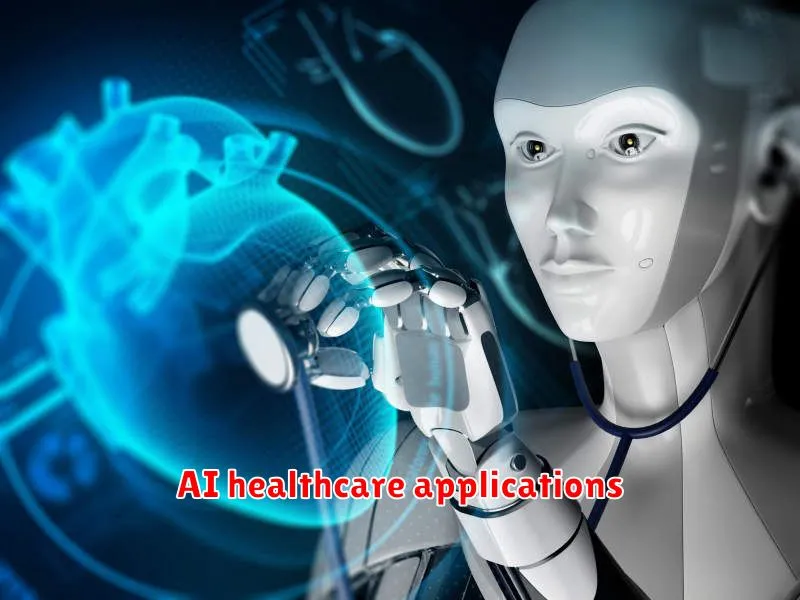The healthcare industry is on the cusp of a revolution, and at the heart of this transformation lies artificial intelligence (AI). From streamlining administrative tasks to revolutionizing diagnostics and treatment, AI is poised to redefine how we approach healthcare, making it more efficient, personalized, and accessible. This article delves into the transformative power of AI in healthcare, exploring its diverse applications and the potential it holds to improve patient outcomes and revolutionize the healthcare landscape.
The rise of AI in healthcare is not simply a technological advancement; it represents a paradigm shift. AI-powered tools are now assisting healthcare professionals in making faster and more accurate diagnoses, developing personalized treatment plans, and even predicting potential health risks. By leveraging the power of data analysis and machine learning, AI is unlocking new possibilities in healthcare, empowering both patients and providers to make informed decisions and navigate the complexities of health with greater confidence.
Understanding AI’s Role in Healthcare
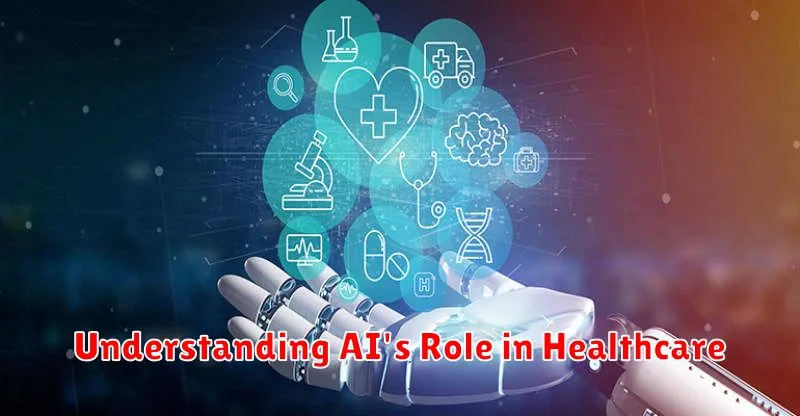
Artificial intelligence (AI) is rapidly transforming the healthcare landscape, offering the potential to revolutionize how we diagnose, treat, and manage diseases. From assisting doctors in making faster and more accurate diagnoses to developing personalized treatment plans and improving patient care, AI is playing a crucial role in enhancing healthcare outcomes.
One of the key areas where AI is making a significant impact is in diagnosis. AI algorithms can analyze vast amounts of medical data, including patient records, images, and genetic information, to identify patterns and predict potential health risks. This can help doctors make more informed diagnoses and detect diseases at an earlier stage when they are more treatable.
Another important area where AI is making a difference is in treatment planning. AI-powered systems can analyze patient data and suggest personalized treatment plans based on their individual needs and medical history. This can lead to more effective treatments and better outcomes for patients. AI can also assist in drug discovery by identifying potential drug candidates and optimizing drug development processes.
Beyond diagnosis and treatment, AI is also contributing to improving patient care. AI-powered chatbots can provide patients with 24/7 support, answer their questions, and provide basic medical advice. AI can also be used to monitor patients remotely, track their vital signs, and alert healthcare providers to potential health issues.
While AI holds immense potential for improving healthcare, it’s important to note that it is not a replacement for human healthcare professionals. Instead, AI should be seen as a valuable tool that can augment and enhance human capabilities. As AI continues to evolve, it will likely play an even greater role in shaping the future of healthcare, leading to more efficient, personalized, and effective care.
Improving Diagnostics with AI-Powered Imaging
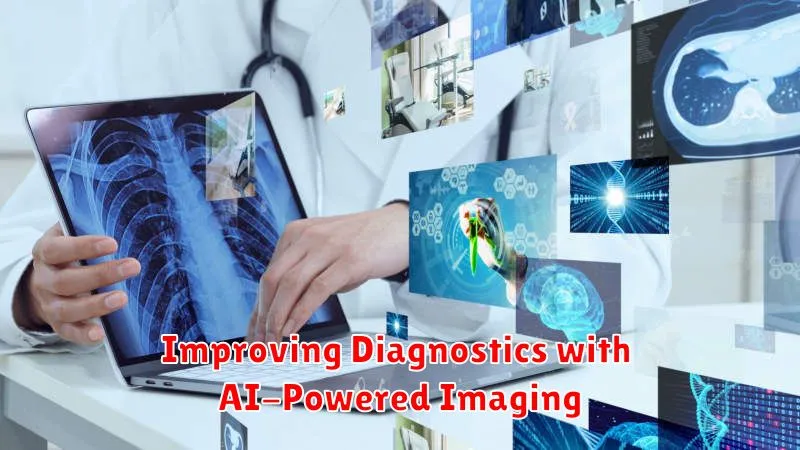
Artificial intelligence (AI) is rapidly transforming healthcare, and one of its most exciting applications is in medical imaging. AI-powered imaging can significantly improve diagnostic accuracy, efficiency, and speed, leading to better patient outcomes.
Traditionally, medical imaging interpretation has relied heavily on human expertise, which can be subjective and prone to errors. AI algorithms, on the other hand, can analyze vast amounts of image data with incredible precision and speed, identifying patterns that might be missed by human eyes. This can lead to earlier and more accurate diagnoses, enabling timely interventions and potentially saving lives.
Here are some specific ways AI is revolutionizing medical imaging:
- Automated Detection: AI algorithms can automatically detect anomalies in images, such as tumors, lesions, and fractures, flagging them for further review by radiologists.
- Improved Accuracy: AI models trained on large datasets can achieve high accuracy rates in identifying various medical conditions, often surpassing human performance.
- Enhanced Efficiency: AI can streamline the imaging process by automating tasks like image segmentation and annotation, freeing up radiologists to focus on complex cases.
- Personalized Treatment: AI can help identify patients who may benefit from specific treatments based on their individual imaging characteristics.
AI-powered imaging is not a replacement for human expertise but rather a powerful tool that complements it. Radiologists and other healthcare professionals can leverage AI to enhance their decision-making, leading to more effective and efficient care.
As AI technology continues to evolve, we can expect even more transformative applications in medical imaging, further revolutionizing healthcare and improving patient lives.
Personalized Treatment Plans Through AI Algorithms
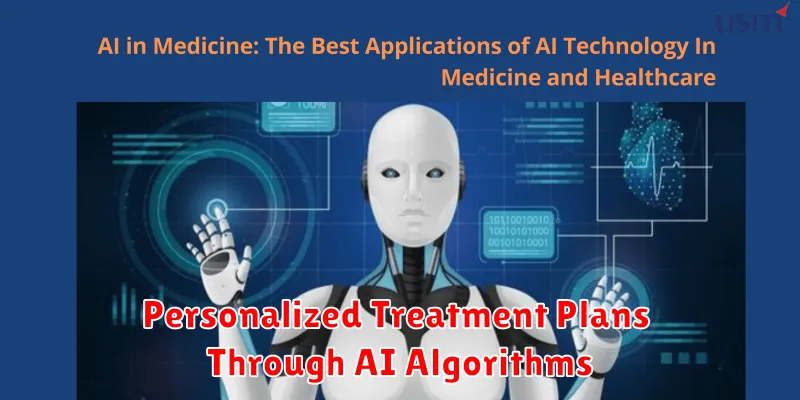
The field of healthcare is undergoing a revolutionary transformation with the advent of artificial intelligence (AI). One of the most promising applications of AI in healthcare is the development of personalized treatment plans. AI algorithms can analyze vast amounts of patient data, including medical history, genetic information, and lifestyle factors, to create tailored treatment strategies that are more effective and efficient than traditional approaches.
By leveraging machine learning techniques, AI algorithms can identify patterns and correlations in patient data that human clinicians might miss. This enables them to predict disease risk, personalize drug dosages, and recommend appropriate therapies based on individual patient characteristics. For example, AI-powered tools can analyze genomic data to identify specific mutations associated with certain diseases, leading to more targeted treatments and therapies.
Personalized treatment plans based on AI algorithms offer several advantages. They can improve treatment outcomes by tailoring therapies to individual needs, reducing the risk of adverse effects, and enhancing adherence to treatment regimens. They can also streamline the healthcare process by automating tasks such as appointment scheduling and medication refills, freeing up clinicians to focus on patient care.
The use of AI in healthcare is still in its early stages, but the potential for personalized treatment plans is immense. As AI technology continues to advance, we can expect to see even more innovative applications that will revolutionize the way healthcare is delivered. By harnessing the transformative power of AI, we can move towards a future where healthcare is more personalized, effective, and accessible for all.
Enhancing Patient Care with AI-Driven Virtual Assistants
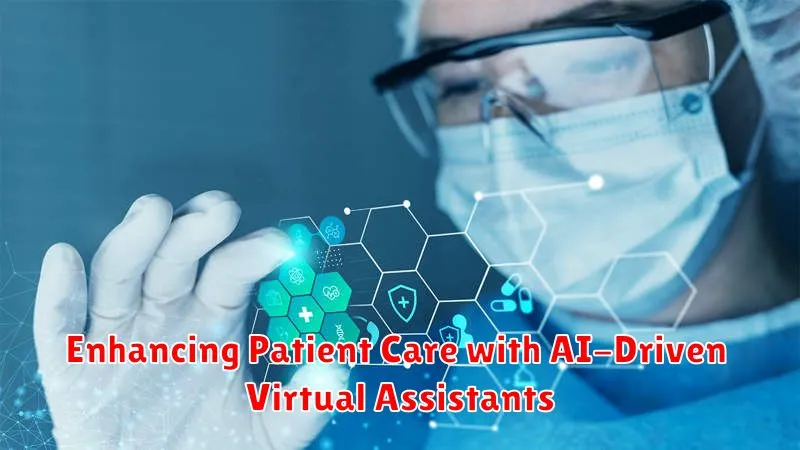
The healthcare industry is undergoing a significant transformation, driven by advancements in artificial intelligence (AI). One of the most promising applications of AI in healthcare is the development of AI-driven virtual assistants, which are revolutionizing patient care by providing personalized and efficient support.
AI virtual assistants can automate various tasks, freeing up healthcare professionals to focus on more complex aspects of patient care. They can schedule appointments, provide reminders for medication, and answer patient queries, improving overall efficiency and reducing administrative burden.
Moreover, AI-powered virtual assistants can provide personalized support to patients. They can collect and analyze patient data, including medical history, symptoms, and lifestyle choices, to provide tailored advice and recommendations. This personalized approach can enhance patient engagement and empower them to take an active role in their health management.
Furthermore, AI virtual assistants can offer 24/7 availability, ensuring patients have access to information and support whenever they need it. This is particularly crucial for individuals with chronic conditions or who live in remote areas with limited access to healthcare services.
By leveraging AI, healthcare providers can significantly enhance patient care and improve health outcomes. AI-driven virtual assistants offer a transformative approach to patient engagement, providing personalized support, reducing administrative burden, and increasing accessibility to healthcare services.
Drug Discovery and Development Accelerated by AI

Artificial intelligence (AI) is rapidly transforming various industries, and healthcare is no exception. In the realm of drug discovery and development, AI is emerging as a powerful tool that has the potential to revolutionize the process, accelerating the journey from lab to clinic.
Traditionally, drug discovery has been a lengthy and expensive endeavor, often taking years and billions of dollars to bring a new drug to market. AI algorithms can analyze massive datasets, identify potential drug targets, and design new molecules with desired properties, significantly reducing the time and cost associated with drug discovery.
One of the key benefits of AI in drug development is its ability to accelerate target identification. AI can sift through vast amounts of genomic and proteomic data to pinpoint potential drug targets that could be missed by traditional methods. This process can be further enhanced by using AI-powered machine learning algorithms to predict the efficacy and safety of drug candidates.
Moreover, AI is revolutionizing the way drugs are designed and optimized. AI algorithms can generate novel molecular structures with specific properties, potentially leading to the development of more effective and safer drugs. This process can be further refined through AI-powered simulations that predict how molecules will interact with target proteins.
The use of AI in drug discovery and development is not without its challenges. One of the key concerns is the need for high-quality data and robust algorithms to ensure the accuracy and reliability of AI-powered predictions. Another challenge is the need for collaboration between AI experts, drug developers, and clinicians to translate AI insights into real-world applications.
Despite these challenges, the potential of AI to accelerate drug discovery and development is undeniable. As AI technologies continue to evolve, we can expect to see even more groundbreaking advancements in this field, ultimately leading to the development of new therapies that can improve patient outcomes and transform healthcare.
Streamlining Administrative Tasks with AI
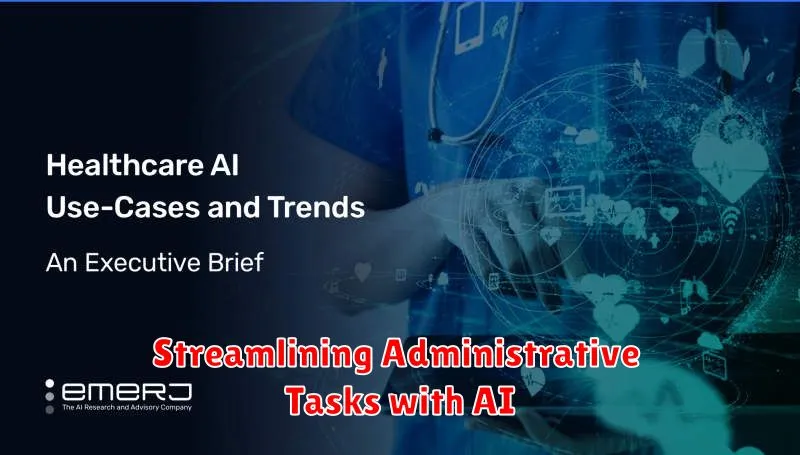
In the realm of healthcare, where efficiency is paramount, artificial intelligence (AI) is emerging as a transformative force, revolutionizing various aspects of patient care and administrative processes. One of the most significant contributions of AI lies in its ability to streamline administrative tasks, freeing up healthcare professionals to focus on what matters most – patient well-being.
AI-powered tools can automate repetitive and time-consuming tasks such as scheduling appointments, managing patient records, and handling insurance claims. This automation significantly reduces the administrative burden on healthcare staff, allowing them to devote more time to patient interactions, diagnosis, and treatment.
For instance, AI-powered chatbots can handle basic inquiries from patients, providing instant responses and resolving queries without the need for human intervention. This not only enhances patient satisfaction but also frees up healthcare professionals to address more complex issues.
Moreover, AI can analyze vast amounts of data to identify patterns and trends, enabling healthcare providers to make more informed decisions about resource allocation, patient care, and operational efficiency. This data-driven approach can optimize workflows, improve patient outcomes, and reduce overall costs.
As AI continues to evolve, its role in streamlining administrative tasks in healthcare will become even more prominent. With its ability to automate, analyze, and optimize, AI empowers healthcare professionals to provide better care, enhance patient experiences, and ultimately revolutionize the healthcare landscape.
Predictive Analytics for Proactive Healthcare Management

The healthcare landscape is undergoing a profound transformation, driven by the emergence of Artificial Intelligence (AI) and its transformative power. Among the many applications of AI in healthcare, predictive analytics stands out as a game-changer, enabling proactive healthcare management and improving patient outcomes.
Predictive analytics utilizes data-driven models to forecast future events, such as disease risk, patient readmissions, and potential health complications. By analyzing vast amounts of patient data, including medical records, demographics, lifestyle factors, and genetic information, these models identify patterns and predict the likelihood of specific health outcomes.
Proactive healthcare management based on predictive analytics offers numerous advantages:
- Early Disease Detection and Prevention: By identifying individuals at high risk for specific diseases, healthcare providers can intervene early, implementing preventative measures and potentially delaying or even preventing disease onset.
- Personalized Treatment Plans: Predictive models can tailor treatment plans based on individual patient characteristics and risk factors, maximizing treatment efficacy and minimizing side effects.
- Reduced Healthcare Costs: By preventing hospital readmissions, managing chronic conditions effectively, and optimizing resource allocation, predictive analytics can significantly reduce healthcare costs.
- Improved Patient Engagement: Predictive models can empower patients by providing personalized health recommendations, promoting self-management of conditions, and fostering proactive engagement in their healthcare.
Examples of predictive analytics applications in healthcare include:
- Predicting patient readmission risk to enable targeted interventions and reduce readmission rates.
- Identifying patients at risk for chronic conditions like diabetes or heart disease, allowing for early intervention and disease management.
- Personalizing cancer treatment plans based on individual tumor characteristics and genetic factors.
- Optimizing hospital resource allocation by forecasting patient volume and staffing needs.
The transformative potential of predictive analytics in healthcare is undeniable. By harnessing the power of AI and data-driven insights, healthcare systems can move towards a more proactive, personalized, and cost-effective approach to patient care, ultimately improving health outcomes and enhancing the overall well-being of individuals and society.
Ethical Considerations of AI in Healthcare
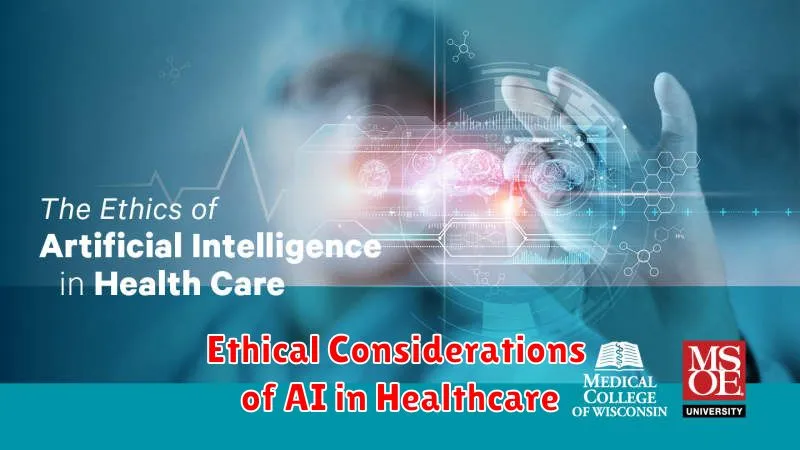
Artificial intelligence (AI) is rapidly transforming the healthcare landscape, offering unprecedented opportunities to improve patient care, diagnose diseases earlier, and develop new treatments. However, as AI increasingly takes on critical roles in healthcare, it is crucial to address the ethical considerations that arise.
One of the most pressing ethical concerns is bias. AI algorithms are trained on large datasets, and if these datasets contain biases, the algorithms will inherit them. This can lead to discriminatory outcomes, such as misdiagnosis or disparities in treatment. For example, an AI-powered diagnostic tool trained on data primarily from white populations may perform less accurately for people of color.
Another critical issue is transparency and explainability. Many AI algorithms are considered “black boxes,” meaning it is difficult to understand how they reach their decisions. This lack of transparency can make it challenging to identify and address biases, hold developers accountable, and gain patient trust. It’s important for AI systems to be explainable, allowing healthcare professionals to understand the rationale behind the algorithm’s recommendations.
Data privacy and security are also paramount. AI systems often rely on large amounts of sensitive patient data. It is vital to ensure that this data is collected, stored, and used ethically and responsibly, protecting patient confidentiality and privacy.
Furthermore, autonomy and informed consent are critical. Patients should be fully informed about the use of AI in their care, and they should have the right to refuse or opt out of AI-powered interventions. We need to ensure that AI is used in a way that respects patient autonomy and preferences.
Addressing these ethical considerations is essential to ensure that AI is used responsibly and beneficially in healthcare. Open dialogue among stakeholders, including healthcare professionals, researchers, ethicists, and policymakers, is critical to develop and implement AI ethically. By carefully considering the ethical implications of AI in healthcare, we can harness its transformative power to improve patient outcomes while safeguarding human dignity and rights.
The Future of Healthcare: AI-Powered Advancements
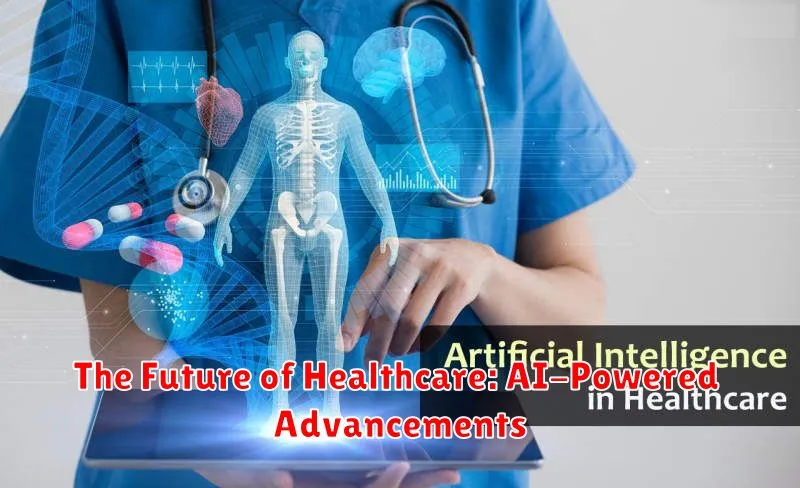
The healthcare industry is on the cusp of a revolution, fueled by the transformative power of artificial intelligence (AI). AI is poised to redefine how we diagnose, treat, and manage health conditions, ushering in a future of personalized and proactive care. From drug discovery and disease prediction to robotic surgery and virtual assistants, AI is rapidly making its mark on every aspect of healthcare.
One of the most promising applications of AI is in disease prediction and early detection. AI algorithms can analyze vast amounts of data, identifying patterns and risk factors that may indicate the onset of a disease. This allows for timely interventions and personalized treatment plans, potentially improving patient outcomes and reducing healthcare costs. For instance, AI models can analyze medical records, lifestyle data, and genetic information to predict the risk of developing diabetes or heart disease.
Another exciting area is drug discovery and development. AI can significantly accelerate the process of identifying and testing new drugs, by analyzing vast libraries of compounds and predicting their potential efficacy. This can lead to the development of more effective and targeted therapies for a wider range of diseases. Moreover, AI can aid in the design of clinical trials, ensuring they are more efficient and yield valuable insights.
AI is also transforming the way we diagnose and treat diseases. AI-powered imaging analysis can assist radiologists in detecting subtle anomalies in scans, improving diagnostic accuracy. AI-driven virtual assistants can provide personalized health advice and support, reminding patients to take their medications or schedule appointments. AI-powered robots are assisting surgeons in performing complex procedures with greater precision and minimizing complications.
As AI technology continues to advance, we can expect even more groundbreaking applications in healthcare. AI-powered wearables and sensors can continuously monitor patient health, providing real-time data that can be analyzed to anticipate and prevent health issues. AI-driven chatbots can provide 24/7 support and answer patient questions, reducing the burden on healthcare providers. The future of healthcare is bright, with AI poised to play a pivotal role in improving patient care, reducing costs, and ultimately enhancing the overall health and well-being of individuals worldwide.

